"I'm gonna be the last man snackin'," M. R. Robinson grins as he indicates his storeroom. Sixtyish, short with clipped silver hair and a ramrod back, Robinson looks more like a military man than the artist and master carpenter he currently is. Last year, Robinson foresaw the recent economic downturn and, worried that events might spiral into a survivalist's nightmare, he began buying food.
One large room in his home is packed with cans, jars and dry goods -- over two years' supply for a large family.
"I have a half ton of sugar, a quarter ton of salt," he explains as he pats one of dozens of large blue Tupperware containers lining his walls. Boxes of oats and bags of beans line the room, too. According to him, dry foods are the best long-term bargains because they require little storage space and pack a lot of nutrition into relatively small quantities. "Just add water. It triples the weight.
A former cab driver from Chicago who hitchhiked across America in his youth, Robinson has a confident laugh. "I've survived on the street," he says. "I've survived on the roads. I've survived here in nature. I can survive. Most people aren't like that -- they aren't used to having nothing."
The economic downturn is going to be hard on Americans, Robinson believes -- they are too used to having the government take care of them. He thinks most people aren't independent enough, though he concedes that Humboldt County residents may be better equipped than people elsewhere. Also, our rural setting gives us plenty of opportunities to live off the land.
Robinson, though, isn't planning on depending exclusively on hunting or gardening. He feels that a large store of food may be necessary to get through the months or even years when society's transport systems could be disrupted. Many of the disaster sites recommend having a three-day supply of food and water. But he scoffs at the skimpiness of their imagination. "Three days! That's not surviving! You can hold your breath for three days. You need years."
To accumulate this large supply, Robinson first began bringing home canned meals like soup, stew and chili. The process of deciding how much to buy was simple. He planned out seven meals (a week's worth of items to eat) then he bought 50 times that amount, roughly one year's worth. For instance, he decided one night's dinner would be chili, one night's beef stew, another would be chicken noodle, etc., and bought 50 family-sized cans of each. Then he went back and doubled the amount for two years' worth of supplies.
Then he realized that his wife, who is currently living closer to town, would probably want to cook meals rather than just subsist out of cans and jars and so he began buying large amounts of staples such as sugar and grains.
Truth is, the diet that Robinson would enjoy in the event of societal collapse isn't too different from the one he already has. Removing a lid from a crockery bowl on the table, he shows off the heavily sweetened oatmeal underneath. He digs a spoon into the cold grain and takes a bite with satisfaction.
"I live on Third World food, but as a whole [our society] eats fat," he says. "We eat stimulants. We don't eat real food. Walk in the market; half the food isn't really food. It's treats. It's flavors."
The majority of people would have a hard time living his way, he says. His pale blue eyes above the sharp blades of his cheekbones narrow and he adds, a little scornfully, that for most Americans, hard times would be "not getting a toy at Wal-Mart anymore."
Robinson, though, prides himself on making do without many luxuries. He rarely lights the fire. "When I get goose bumps, I know I'm doing what nature says to survive," he says. "If most of us were actually transported to Africa we'd cash in because we're so taken care of here. I don't have Internet, TV, electricity."
What he does have is supplies, and a vision of the future in which those supplies become crucial. With his mission to build a wall of food between himself and a disaster that might not happen, Robinson may have taken farther than most the need to be autonomous from society, yet his desire appears to be one that many in this county can relate to. A great source of comfort is a sense of reliance on one's self, a feeling of independence that many Humboldt County residents appear to possess in abundance.
How common are Robinson's instincts in Humboldt County today? For now, paradoxically, there's no better place to judge the mood than at the store.
Alan Rice, quietly defying stereotypes as both a board member of the Eureka Symphony and the co-owner of Bucksport, an old-fashioned sporting goods store, observes that people aren't changing their buying habits much. They are purchasing slightly more archery and fishing supplies and more safes than last year, but they aren't panicking or radically shifting their spending. Speaking in measured, thoughtful words that seem characteristic, he says folks are buying a few items that might help them get food for their families in hard times.
"Our clientele are people that can already take care of themselves," he says. "They are pretty independent."
Unlike the stories flowing darkly from the TV and radio these days, many businesses in the county don't seem to be experiencing much change for the worse. Mark Mathis from Fortuna's Wildwood Saw and Power Equipment says he's not noticing any difference in sales. He notes one person he knows is stocking up on freeze-dried food, but the major problem he sees is that people in general are just "getting tired of listening to the news. It's all doom and gloom." However, he says, "This is affecting emotions but not my customers' lives. We're independent here."
In the Southern part of Humboldt, people have reacted more strongly to the economic downturn. Yet here, too, the response seems to be not panic-stricken -- it simply reflects a desire to be able to take care of one's self without leaning on anybody else. Joanne Brumback, who works at Redway Feed, agrees with her boss Tommy Harwood that their customers began to buy somewhat differently about six months ago. "It all started this spring 'cause gas prices went up and they wanted to be more independent," Brumback says. Folks began looking to grow their own gardens and keep their own stock.
Redheaded, friendly and constantly on the move, Harwood, the young new owner of Redway Feed, says with wonder, "We didn't use to carry any pig food, but this year ... [we] special ordered three different types." And customers snap up food for more than their domestic animals. They're buying food for wild turkeys and other game hoping to lure the creatures close to their homes. Harwood says that they're not planning on killing the wildlife anytime soon but enticing them to stay around "just in case."
Leaning forward, his blue eyes alight with energy, he raises empty hands to illustrate his customers' plight as he relates how this year there was an actual shortage on chickens -- in fact, there was a shortage on several different kinds of poultry, including turkeys and ducks. People all over the country are snapping them up. "They're buyin' 'em for eggs and meat ... so they can be self-sustaining." Other folk, he says, are digging ponds and stocking them with catfish, bass, bluegill and other bream. Seeds, too, disappear fast. One seed company representative told him that sales were up 400 percent this year. However, Harwood believes that some of the high numbers may be due to inexperienced gardeners having to replant after failing to properly take care of their first set. Nonetheless, he does agree that more people are looking into gardening.
The price of gas this spring encouraged Southern Humboldters to buy in bulk to save on shipping, but locals were also stocking up to decrease their reliance on outside sources. According to Harwood, the high prices were "freaking people out the most," but customers were also concerned about not being able to get supplies if the economic downturn got worse. "One guy asked if you can store pet food in a shelter for people to eat," he says. "Some of the stuff is made with human food-grade meat ... We checked it out and the company said it was okay ... One of the yard guys gave him $5 to try one can ... [The fellow said it was] pretty good."
"Why not?" he adds. "A lot of people are doing that, I hear."
Harwood goes on to agree with other business owners that this county doesn't follow the same trend as the rest of the nation. "We don't deal in credit as much as other areas ... more of a liquid economy here. We don't deal on credit cards. [It's] check or cash which is based on something real." And most of his customers aren't looking to make radical changes in their lifestyle. They don't have to. They already live more sustainably than the rest of the nation. By buying more gardening supplies, etc., they simply seek to strengthen their autonomy from a system they were reluctant to rely on anyway.
But there's more to preparation than just food. "You need fuel [to pump water], food and firewood," says M.R. Robinson, who has obviously spent serious time thinking about the subject. "Without a chainsaw, you will freeze -- two young guys with a bucksaw couldn't get enough."
Chris May of Solar Lights and Northern Winds, an alternative energy business based in Southern Humboldt but active throughout the county, says, "I have seen a sort of trend. I don't know if it's self-sufficiency or cutting costs. People are talking to me about installing solar electricity or solar heating. More people are getting prices ... They're interested in electric cars and how to get enough solar electricity to charge them. It can work but it takes a large system."
He's not surprised by the interest being shown in the subject. "Here in Southern Humboldt, it's not such a revelation to become independent." And he says that areas farther up the coast are also getting in touch with him. "Up north, people are more interested in finding ways to become more self-sufficient [too]." He explains that people from the foggier parts of the county express surprise when he tells them that solar works there as well. He has put in several solar banks in Eureka. Wind power is also an excellent source of energy, though not all areas are able to access it.
Choosing wood rather than central heating allows some people to feel more self-sufficient. Joanne Garber of Eureka Stove and Fireside Shop says that while it is "too early in the year for business to pick up [there is] an upswing on wood stoves. Customers don't want to be dependent on a gas company." She adds, "Pellet stoves are also a good bet if you don't want to be dependent."
Many people in Southern Humboldt already live off the electric grid and don't have central heating. In that sense, they are more prepared for problems that might disrupt our economic system than their northern counterparts. Their attitude is almost blasé. John Harmon, a customer of Brown's Sporting Goods in Garberville, notes, "If I can't get gas, my lights will go out, but that's about it."
M.R. Robinson doubts that Middle America will be able to cope if the economy gets much worse.
"It used to be survival meant retirement planning and stocks," he says. "'I have a 401(k) plan; that's survival.' But now that has changed. Now the middle managers won't be able to retire anytime soon. What are they going to do? The middle class are the ones who will hurt. The poor already don't have a house."
People who are used to struggling will get by, he claims, but most folks have gotten soft. "We don't have to survive [on our own] if we have society; the government just shovels money to people."
Robinson concedes that most people would not like a steady diet of the simple foods he has packed away. But he is already used to it. His Spartan lifestyle contrasts sharply with that of most people. True, the cabin he lives in by himself glows with rich golden wood artistically notched together, but he built it himself with almost no assistance. Richly classical paintings add a touch of luxury to otherwise simple furnishings, but they are his -- some of them squeezed from brushes held by half frozen fingers on cold winter days. "I like company," he explains solemnly, though his mouth quirks a little at the joke as he points to several enormous portraits displayed beautifully on easels or hanging from walls made large by the high ceilings he designed himself.
Tucked into the rim of an oak forest, his home holds almost no electrical devices. He has a tiny battery-operated radio, and though family members have persuaded him to buy a cell phone, he has to walk up a steep hill in order to use it. When he gets the urge to paint late at night, he switches on an undersized battery-operated lamp that illuminates only one small corner of his artwork at a time.
He explains the sense of comfort he felt from purchasing his cache of food. "Once I triggered the buy, the rest of it was a done deal. I bought everything that was useful. [Anything that looked] like it would last for awhile. Then I started being diverted to cheaper food. Restaurant supply stores where the price is half -- 50 lbs. of pinto beans for $20! The bags became art objects, things of beauty."
He savors the comfort the supplies give him, but he still worries. If the worst happens and the government isn't able to help, if trucks don't bring in supplies, and people don't have jobs and the money to buy food, he speculates that life could get grim. "We won't share," he says. "We don't share now. Look how we have borders with Mexico. We won't let them come here." He holds out his arms dramatically encircling the air. "'This is mine,' we say."
But Robinson, himself, doesn't envision living through the bleak times alone. In a sense the food, like his portraits, became a form of creating a society. He believes that mental attitude can be crucial in difficult circumstances. People, he says, will have a difficult time coping with just the emotional fallout if the situation gets bad enough. They will need to depend on each other, on family especially.
"Depression will crush your will to survive. You watch society go down ... No more info coming in. You sit around and look at nature ... no jet trails, no TV. How are you going to survive millions of people dying? ... Survival has got to be a family concept. One hard winter, one bad injury ... you need backup. Therefore, that means quantity." He waves his hand towards the stacks of canned goods and staples covering the floor and piled on the shelves.
Even so, he insists that even being prepared with material goods isn't the main solution to a worsening economic situation. In an economic collapse, attitude is everything. "Now I have a whole storeroom full of food," he says. "In my youth I had a can of refried beans for dinner. That can gave me more comfort than the whole room does now."
Load up the larder
Not everyone concedes the need for an abundance of supplies, but most everyone can see the benefits to having a few provisions on hand in case of a natural disaster -- or even a personal one, such as an unexpected expense that may make normal purchases difficult between paychecks.
Most disaster sites recommend a three- to five-day supply of water -- a minimum of six gallons stored for drinking and sanitary purposes. A similar supply of food is also needed. Choose easily stored provisions that your family will actually eat. Canned soup, spaghetti sauce and pasta (remember you need water to cook it) are favorites. Try to arrange for fuel both for basic cooking and for heating. Wood stoves are often the choice, but a small camp stove will work also. Make sure to stock matches to light them. Flashlight, candle or lanterns will make nights much easier and safer. A battery-operated radio may provide welcome information from a reliable source. Extra batteries for it and your flashlight should also be kept in your storage area.
Other important issues include making sure you have an out-of-state friend that your whole family knows to contact should they be unable to find each other in the tumultuous aftermath of a local disaster. A preset place to meet is also critical.
Another important piece of gear is a medical kit. Having at least a three- to five-day store of your prescription medicines is essential, also. Extra items you should be sure to keep on hand include personal comfort items like shampoo, toilet paper, toothpaste, sanitary napkins, razors, sun block and insect repellent.
An excellent site with many links including the Red Cross and FEMA is survivalist.info. Its page of links contains an enormous amount of pertinent information.
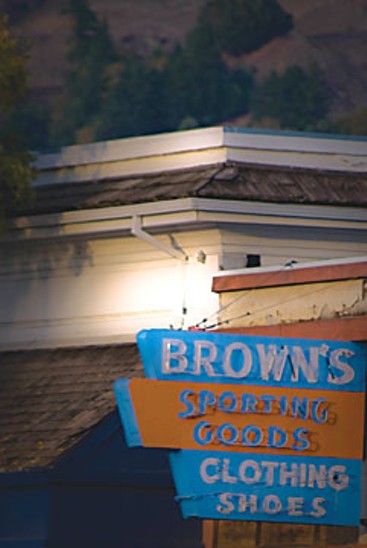
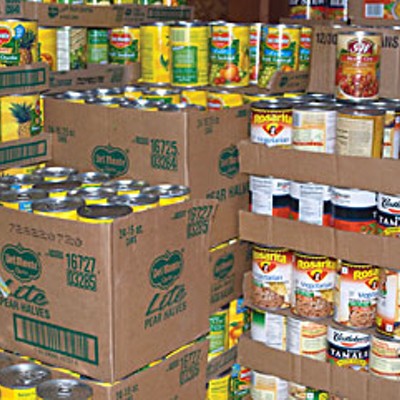

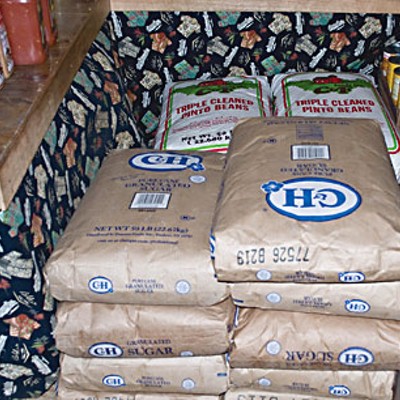
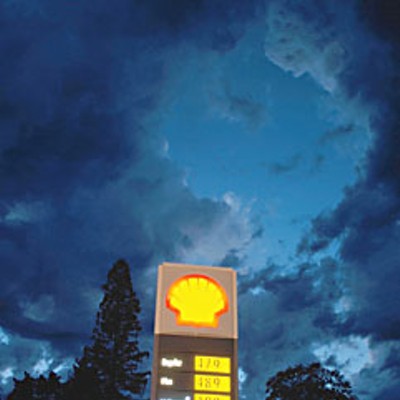

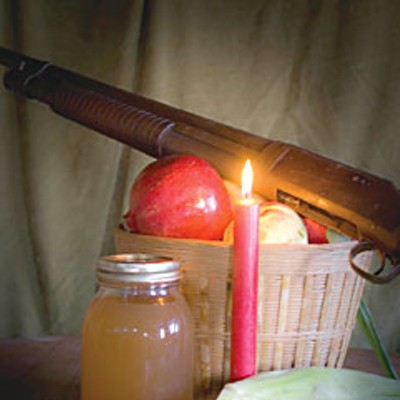


Comments (2)
Showing 1-2 of 2